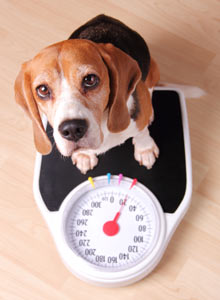Dog Weight Loss: Tips For Helping Your Dog Lose Weight

Dogs are like people: too many calories in and not enough calories out can cause your pooch to be overweight. How can you help your dog lose weight? Knowing the steps to achieve weight loss for your dog can be overwhelming. Below are a few tips that you can use when starting a weight loss program for your dog.
Check with your veterinarian to determine how much weight your dog needs to lose and how quickly it is safe for him to lose it.
- Make sure that your dog is on the correct food for his life-stage. If he is a senior, he needs a diet formulated for older dogs. Adult dogs don't need puppy food anymore. Your veterinarian can give you specific recommendations for your individual dog's life-stage and circumstances.
-
It is important to measure your dog's food. Otherwise, it's very easy to give him more than you intend to. Use a measuring cup that you would use for baking. Determine how much food you are currently feeding your dog daily and decrease it by about 20%. In general, the amounts recommended on over-the-counter food bags are a bit high unless your dog is extremely active.
Monitor your dog's weight after you decrease his food. Usually, your veterinarian will be happy to help you weigh him any time their office is open. If he hasn't lost any weight after two weeks, decrease the food again by about 5%.
- Exercise your dog more. Exercise can sometimes be boring and hard to keep up with. Just remember, playing IS exercise and your dog loves to play with you! Walks and playing fetch are great for you and your dog and you should take him on moderate walks at least twice a day, but playing with toys in the house is exercise too. Make sure you have a large variety of different toys and participate in play sessions with your dog. He'll love it, you'll love it, and it will help him lose weight.
- Go easy on the treats. Dogs love treats and we love to make our dogs happy. But overdoing it on the treats is a great way to sabotage weight loss. One way to decrease the calories that your dog gets from treats is to use a few bites of his regular kibble instead. It will have fewer calories and your dog will still love the interaction with you at treat-time. Another option is to put a strict number of small treats aside in the morning for use throughout the day and, when they are gone, there are no more treats for that day.
- Your dog may need a special diet. Usually, simply feeding a little bit less of your dog's current diet and increasing his exercise will be enough to help him slowly lose weight. Sometimes, though, it may not be quite enough and that's when your veterinarian may recommend a specially-formulated prescription weight loss diet. These diets usually contain higher fiber levels so your dog feels fuller.
Don't change your dog's diet suddenly, as it can cause GI problems or your dog may stop eating. Consult with your veterinarian before changing diets or drastically decreasing the amount of food that you give him.
Using these tips can help your dog safely lose weight and live a longer, happier life.
You May Also Like These Articles:
Hands-On Guide to Checking if Your Dog Is at a Good Weight
Obesity in Dogs: Overview of Causes and Dangers
Giving Your Dog Clean and Fresh Water
Wet Food Vs. Dry Food For Dogs
Disclaimer: This website is not intended to replace professional consultation, diagnosis, or treatment by a licensed veterinarian. If you require any veterinary related advice, contact your veterinarian promptly. Information at DogHealth.com is exclusively of a general reference nature. Do not disregard veterinary advice or delay treatment as a result of accessing information at this site. Just Answer is an external service not affiliated with DogHealth.com.
Notice: Ask-a-Vet is an affiliated service for those who wish to speak with a veterinary professional about their pet's specific condition. Initially, a bot will ask questions to determine the general nature of your concern. Then, you will be transferred to a human. There is a charge for the service if you choose to connect to a veterinarian. Ask-a-Vet is not manned by the staff or owners of DogHealth.com, and the advice given should not delay or replace a visit to your veterinarian.



